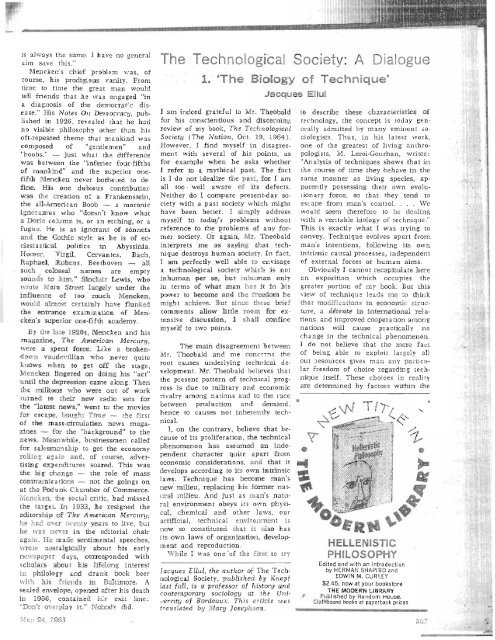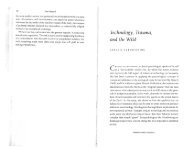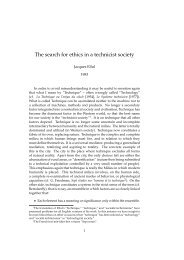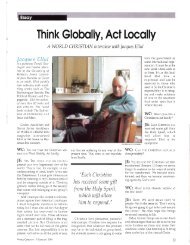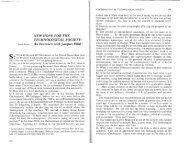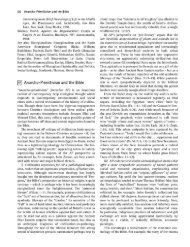vJ o - Jesus Radicals
vJ o - Jesus Radicals
vJ o - Jesus Radicals
Create successful ePaper yourself
Turn your PDF publications into a flip-book with our unique Google optimized e-Paper software.
1--.<br />
is always the same. 1 h ave no general<br />
aim save this."<br />
Menden's chief problem ";as, of<br />
course, his prodigious vanity, From<br />
time to time the great man would<br />
tell friends that he was engaged "in<br />
a diagnosis of the democraCc disease."<br />
His Notes 011 Democracy, published<br />
ill 1926, revealed that he h:l.d<br />
no visible philosophy other th:m hb<br />
oft-repeated theme that mankind was<br />
composed of "gentlE!men" and<br />
"boobs," - just what the difference<br />
was between -the "inferi()r four-fifths<br />
vf mankind" and the superior onefifth<br />
Menden never bothe:::ed to de<br />
fine. His one du'bious contributior<br />
was the creation of a Frankenstein,<br />
the all-American :Boob - a moronic<br />
ignramus who "doesn't know what<br />
a Doric column is. or an etching, or a<br />
fugue. He is as ignorant of sonnets<br />
and the Gothic style as he is of ecclesias<br />
tical politics in Abyssinia.<br />
Homer, Virgil, Cervantes, Each,<br />
Raphael, Rubens, Beethoven - 'all<br />
such colossal names are empty<br />
sounds to him," Sinclair Lewis, who<br />
WTote Ma.in Street largely under the<br />
influence of too much Mencken,<br />
would alImost' certainly have flunked<br />
the entrance examination of MenckE~n's<br />
superior one-fifth academy.<br />
By We late 1920s, Menden and his<br />
magazine, The American Mercury,<br />
were a spent force. Like a bro'kendown<br />
vaudevillian who never quite<br />
knows wben .to get off the stage,<br />
Mencken lingered on doing his "act"<br />
until the depression came along. Then<br />
the mi]]i.(ms who were out of work<br />
. ·turned t
technical apparatus. and this determjnism<br />
becomes more rigorous as itgrows<br />
e\'er more comple~c. This is not<br />
equivalent-according to my way of<br />
thinking - with socialization in the<br />
traditional sense of the term, as :iVIr.<br />
Theobald seems to believe. The resuL<br />
will be a great'er integratiun of the<br />
individual into a society rigorously<br />
organized, not on an ideological but<br />
on a technical basis. using technical<br />
means. In this society the individual's<br />
apparent wider possibilities for action<br />
and self-expression will be basically<br />
illusory.<br />
Technique would not be modified<br />
by changing the external factors which<br />
presently affect it. These external factors.<br />
give technical society its secondary<br />
characteristics, which are sometimes<br />
excessive, This is what I wanted<br />
to show when I spoke of the concentration<br />
camp, ,but I also said in the<br />
last chapter that this is an accidental<br />
result which we C2n expect to disappear.<br />
However, while we can expect<br />
the secondary characteristics to disappear,<br />
this will not. result in any<br />
fundamental change in the nature of<br />
~he problem,<br />
My second point bears on lVIJ:.<br />
Theobald's correct view of my book<br />
as a descliption of what has happened<br />
because man has remained<br />
largely unconscious of the many implications<br />
of technique and has<br />
sought only to profit from it. Bv extrapolation,<br />
my book is also a warn,<br />
ing of what may happen if man does<br />
not come to understand what is happening<br />
and makes no attempt ·to con<br />
.trol the situation. I never denied that<br />
technique has brought some elements<br />
·01' well-lbeing and happiness. If I<br />
failed to discuss this, it is because it<br />
seemed to me so obvious and so well<br />
known as scarcely to bear repeating<br />
that, thanks to technique, man is better<br />
fed and enjoys many improvements<br />
in his lot.<br />
On the other hand, I never intended<br />
to describe any inexorable process or<br />
irievitable doom. I simply declared<br />
that because man does not seem to<br />
realize the extent of the problem, because<br />
our £l'eedom of choice and of<br />
judgment is being reduced, because<br />
our technical milieu is becoming<br />
more complex, the evolution that I<br />
described seems increasingly likely.<br />
It is therefore only the. ever-increasing<br />
probability of this development that<br />
I sought to emphasize.<br />
When it is argued that man can<br />
act effectively when confronted with<br />
[hi; situation and can find mc:tns to<br />
5GB<br />
the course of c\'olut:cn in<br />
chanL~C<br />
technical society, I would like to believe<br />
it. But the problem must be posed<br />
in concrete tonn;: Of whom are we<br />
speaking when we say "man" ! myself<br />
do not believe in the existence of<br />
"man" in the abstract. ,\VI:-;rJm. the,1')<br />
The intellectu"ls The technicial1s<br />
The politicians E~act analysis shows<br />
to what degl.'ee they are powerless<br />
since it is they who are most involvcd<br />
in this evolution. NOT could any individual<br />
be effective because his personal<br />
decisions could not possibly influence<br />
the source of society. Philosophers<br />
and artists are completely<br />
eliminated from the reckoning by the<br />
mere fact of their being nontechnical<br />
men. (All that obviously callS for<br />
lengthy proof!) Thus, what is needed<br />
is a, kind of psychological and spiritual<br />
revolution affecting a considerable<br />
group of people. But at present, it<br />
seems to me that this has not yet<br />
begun and that it is not scientifically<br />
predictable.<br />
The worst of illusions, however,<br />
would be to ·believe that, one way or<br />
another. the problem will resolve itself.<br />
The Marxists live in a utopian<br />
dream which claims that all technical<br />
difficulties will automatically be re<br />
.solved by the transition to a Communist<br />
society. However, it is equally<br />
illusOTY to think that any historical<br />
or economic evolution will automatically<br />
c,-,U rOl'th. a positin' response tu<br />
its challenges; or 'yet to believe-a:::;<br />
many do-that teebllical progt'ess it,:<br />
sdf will resoh'e the pl'01JJems created<br />
by techllique. In fact. only th€ 1ll0H~<br />
obvious, fragmented problems will he<br />
sO reso1v·~d. For ins(an~e, "1'!1ilc :J..lltDmatio:1<br />
frees m
lim only :,rgujnj; I h::lt m~JlY types of<br />
50do-economk systems ::lre comp:1til>le<br />
with the tech!lologkal cnvironmen\<br />
which is so xapidlygrowing up<br />
arQuqd us, and f1 at man will determine<br />
~ whether by conscious choice<br />
Qt, !>!iriq default - tbe 'type of socioeconomic<br />
system which d.eveloys.<br />
, 1 find Ellurs posi tiOll on this iSSll~<br />
ambiguous: he seems 8t n18ny points<br />
in the oo.ok ami in his l'eply '0 deny<br />
man's pOI'Ver to influerlce the technological<br />
environment. Indeed, at<br />
times, be appears to believe in a<br />
rather eX,treme technological deterniinisrri:<br />
Y~t in spite of this, at the<br />
end of his reply, he quite clearly<br />
states thalt man can find "the pa:}1<br />
to a new freedom."<br />
While Ellul and r may disagree on<br />
this point, we al'e in complete agreement<br />
that "man does not seem to<br />
):ealize t!Ie extent of the problem" and<br />
that lm~il :be does so, technique - or<br />
technological deteIminism-will guide<br />
()til' future. However, EJlul is far more<br />
negativ'e t!lan I am ab()ut the possibility<br />
f perceiving the gr3Vity of the<br />
threat and acting effectively to counter<br />
it.<br />
Ellul dismisses the intellectuals,<br />
the technicians, the politicial1S, the<br />
philosopbers an~ the artists as sources<br />
of undEJ'standing: and leadership.<br />
Elilli als() dismisses the individual on<br />
the groulu!s tllat "one man's pel'sonal<br />
decision could not influence the<br />
course of society,"<br />
T:his is surely a total misunderstanding<br />
of the function and poten<br />
'Hal of individual leadership. As Toynbee<br />
and many otbers have pointed<br />
ou t, societY' has always been changed<br />
hy the wisdom and courage of a very<br />
few, The need for leadership has<br />
never been greater than it is today,<br />
and the potential f()r effective leadership<br />
has also never been greater.<br />
Many social sdentists who are con<br />
C'erned witth th e pIohlell1s of achieving<br />
social ell ange woul d deny this<br />
statement, claiming ihat society has<br />
never been so hard to change, that<br />
rhe i ndivi cIu81 h:J s never had so Ii ttl c<br />
PO'\


